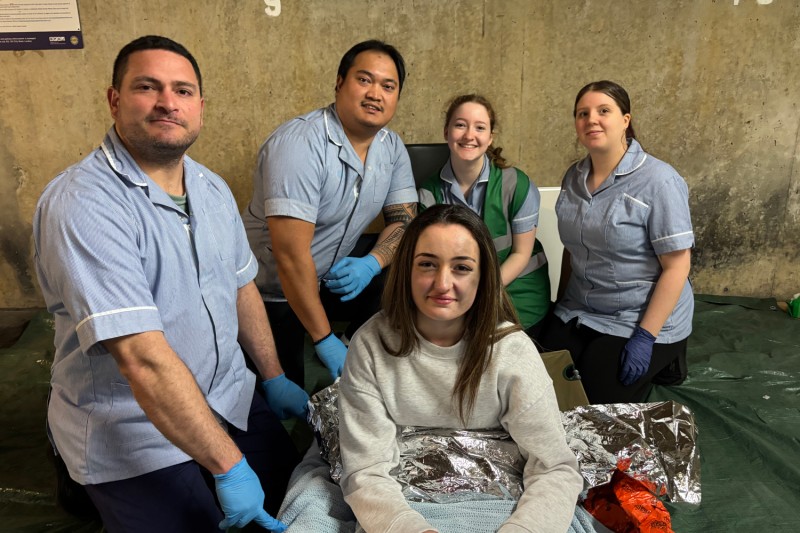Course fees
£1,050.00
For fees and funding info please refer to the FAQs
05 Dec 2025 (Intake closed)
Apply by: 31 Oct 2025
Dec 2025
Online
Attendance dates: 05 Dec 2025, 12 Dec 2025, 09 Jan 2026, 16 Jan 2026
Accredited by




Course overview
The aim of the Intimate Partner Violence and Abuse (IPVA) Unit is to critically reflect on your practice and enhance knowledge of coercive control.
This Master's level unit is aimed at all professionals in professional roles who come across and support those who have experienced IPVA as victim/survivors.
Students will be able to gain a systematic understanding of relevant literature including a critical awareness of current issues and recent research related to coercive and controlling behaviours.
This unit seeks to address the needs of those working in a wide variety of fields who come across victim/survivors of IPVA. It is intended for practitioners and leaders within Health and Social Care and the Criminal Justice settings who have responsibilities for supporting victims/survivors and/or signposting, and those in leadership roles who lead/manage people who support those experiencing IPVA.
The Domestic Abuse Act 2021 has a range of responsibilities for different professionals, including:
- Local authorities who have a duty to provide support to victims of domestic abuse including:
- assessing support need, delivering a domestic abuse strategy and providing support for children, counselling and therapy, housing-related advice and support, and specialist support for victims with complex needs.
- General practitioners who should have a clear protocol in place for dealing with domestic abuse.
- Social workers who should take into account and address the needs of children who live with domestic abuse, as well as the needs of the main victim.
- Employers who should be aware of the impact of domestic abuse on employees at work.
- Police who have responsibility for responding to calls and investigating incident.
To undertake these activities, it is incumbent upon professionals to have clear understanding of IPVA and what constitutes coercive control. IPVA comes under the umbrella of domestic abuse and considers abuse between so-called romantic and/or sexual partners.
Students will critically reflect on their approach to working with victim/survivors and apply this understanding to their practice/professional role. Students will extend their knowledge of themselves when engaging with colleagues and other stakeholders, including reflecting on their leadership style and skills. They will also critically examine their own service/role related to professional, organisational, social and cultural contexts.
Students will receive structured opportunities for critical reflection within a well-resourced and research-informed learning community.
Overview of course
Key topics covered in this unit are:
- Domestic Abuse Act 2021
- The social context - Age, Culture, Race and Religion, Gender and Sexuality, Disability and their intersectionality
- Application to theories and models - Including The Duluth model, The Homicide Timeline, Social Construction
- Exploration of coercive controlling behaviours
- Short, medium and long-term effects of experiencing IPVA - Impact on Children
- Support and Safeguarding - Legislation, Managing risks, safety planning and sign posting
This unit can be undertaken as part of the MA Leading and Developing Services programme.
Learning outcomes
Having completed this unit, the student is expected to demonstrate:
- A systematic understanding of relevant literature including a critical awareness of current issues and recent research aligned to IPVA.
- An understanding of how to evaluate risk and undertake safety planning
- The ability to critically evaluate and improve practice when supporting victim/survivors of IPVA, taking into account current legislation, professional and organisational benchmarks and standards
- Critically reflect on professional practice through drawing on the evidence-based knowledge and critically explore what constitutes personal and organisational accountability applying this understanding to their practice/role.
Teaching
This course is taught virtually and will consist of online blended learning and teaching methods; including ‘live’ virtual seminars, case studies, recorded presentations, reflective activities, tutorial support and online resources provided through Bournemouth University’s virtual learning environment. Unit guides and specific reading materials will be designed to enable students to continue in the professional development of their existing knowledge base and maximise opportunities to advance their professional practice. Core text, and encouragement to read widely, will also provide foundation knowledge for students to analyse and advance their professional practice. Small group tutorials will also be offered to discuss the assignment.
Assessment
Your assignment will be in the form of a reflective essay and associated action plan.
Course details
Course leader
Orlanda Harvey (harveyo@bournemouth.ac.uk) & Louise Oliver (LOliver@bournemouth.ac.uk)
Course delivery
Online
Downloads
Prerequisites
Normally students may enter Level 7 (Master's level) study if they have been awarded:
- Undergraduate degree (honours or non-honours)
- An equivalent qualification (the learning outcome of which are demonstrably appropriate in terms of knowledge, understanding and skills) equivalent to 120 credits at Level 6.
Why choose BU?
Bournemouth Gateway Building is the home of the Faculty of Health and Social Sciences. Its 10,000 square metres of space has created a unified base for the faculty’s education, research and office activities, which previously took place across several buildings in the Lansdowne area. It is open and accessible to all BU students, staff and the community.
We have a long and close association with health and social care practice partners across the region and enjoy close relationships with Dorset Healthcare University Foundation Trust, University Hospitals Dorset and District Hospitals (Yeovil and Salisbury) and Dorset County Hospital.
We are an established, vibrant and supportive academic community of staff, clinical practitioners, students and service users. Our team of highly qualified nursing staff and social scientists are committed to developing the next generation of outstanding, skilled and compassionate practitioners, having been engaged in developing the nursing workforce for over 25 years.


Make an enquiry
Make an enquiry
